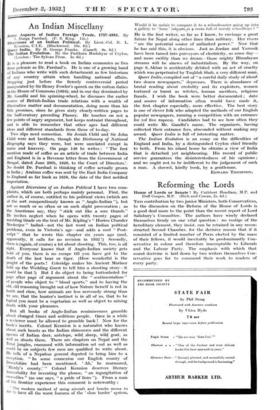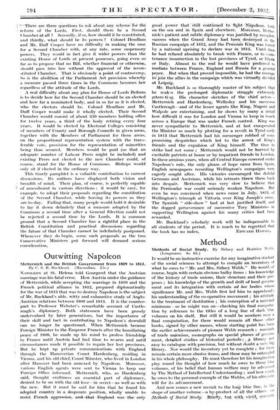Reforming the Lords
House of Lords or Senate ? By Cuthbert Headlam, M.D. and Duff Cooper, M.P. (Rich and Cowan, 2s. tki.) Tim contribution by two junior Ministers, both Conservatives, to the discussion on the Reform of the House of Lords is a good deal more to the point than the recent report of Lord Salisbury's Committee. The authors have wisely declared themselves firmly on one vital question : no vestige of the hereditary element, they insist, can be retained in any recon- structed Second Chamber, for the decisive reason that if it consisted of a limited number of Peers elected by the mass of their fellows, it would inevitably be predominantly Con- servative in colour and therefore inacceptable to Liberals and the Labour Party. The emphasis with which that sound doctrine is laid down by two writers themselves Con- servative goes far to commend their work to readers of every party.
...;.-71'ifete are three ciueitions' to ask abOut stay schen-1610r the reform of the Lords. First, should there be a Second Chamber at all ? Secondly, if so, how should it be constituted, and thirdly, what should be its powers1 Colonel -Headlam and Mr. Duff Cooper have no difficulty in making- the case for a Second Chamber with, at any rate, some suspensory powers. They would in fact give it wider powers than the existing House of Lords at present possesses, going even so far as to propose that no Bill, whether financial or otherwise; - should pass into law without the approval of the recon- stituted Chamber. That is obviously a point of controversy. So is the abolition of the Parliament Act provision whereby a measure passed three times in the Commons becomes law regardless of the attitude of the Lords.
A real difficulty about any plan for House of Lords Reform is to decide how far the Second Chamber should be an elected and how far a nominated body, and in so far as it is elected, who the electors should be. Colonel Headlam and Mr. Duff Cooper would make it wholly elected. Their Second Chamber would consist of about 350 members holding office for twelve years, a third of the body retiring every four years. It would be elected by Electoral Colleges consisting of members of County and Borough Councils in given areas, together with the Members of Parliament for those areas, On the proportional representation system with the trans- ferable vote, provision for the representation of minorities being thus secured. Members would be paid (so that an adequate number of Labour Peers might be included) and existing Peers not elected to the new Chamber could, of course, stand for the House of Commons. Bishops would only sit if elected in the ordinary way.
This timely pamphlet is a valuable contribution to current discussions. Its authors have displayed both vision and breadth of mind. Their plan, of course, is perfectly capable ' of amendment in various directions : it would be easy, for ' example, to adopt their proposals regarding the constitution ' of the Second Chamber, while leaving its powers as they are to-day. Failing that, many people would hold it desirable to lay it down definitely that a measure adopted by the Commons a second time after a General Election could not • be rejected a second time by the Lords. It is common ground that a Second Chamber has a rightful place in the British Constitution and practical discussions regarding the future of that Chamber cannot be indefinitely postponed. Whenever they do begin, some such proposals as the two Conservative Ministers put forward will demand serious consideration.











































 Previous page
Previous page